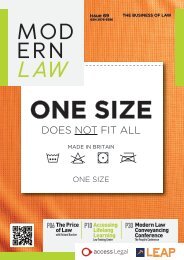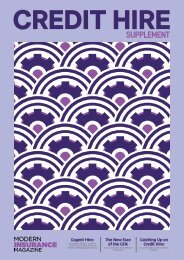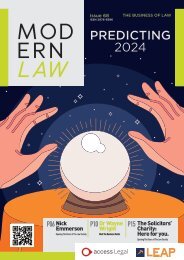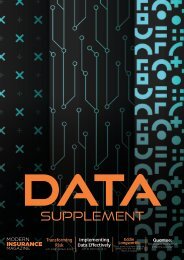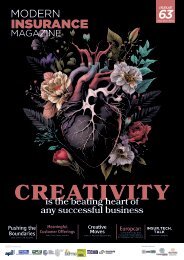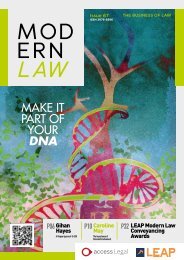Modern Insurance Magazine Issue 66
Insight: Unlocking Profitable Growth: Boosting Insurance Sales Efficiency by 18%, by Philipp Kaupke, Simon, Kucher & Partners Strategy & Marketing Consultants, Zürich Interview: Navigating a Complex Landscape by Richard Nash, Aon Interview: The True Meaning of Partnership with James Roberts, Europcar Editorial Board: Find out what our editorial board panel of experts have to say in this edition of Modern Insurance Magazine. Associations Assemble: Modern Insurance’s panel of resident associations outline the burning issues in insurance. The Fraud Board: Don’t miss our next instalment of The Fraud Board, where our growing collective of fraud experts convene to discuss the key factors affecting the fight against fraud in our industry today. FMG: Positive Cultures Attract Top Talent ParaCode: Do You Have A Healthy Relationship With Your Insurance Software Partner? Laird: Embracing Automation: Q&A with Nik Ellis Just a Thought with Eddie Longworth… ‘Groupthink’ Destroys Claims Integrity I Love Claims / ARC 360: Managing Expectations Amidst Cut-Back Cover Insurtech Insights: Interviews with Rob Newbold, Verisk; Franklin J. Manchester, SAS; Dr. Matthew Jones, Fathom; Charlie Sidoti, Innsure; Valkyrie Holmes, Faura; Dr. Maryam Golnaraghi, The Geneva Association. Insur.Tech.Talk Editorial Board: Experts from within the insurtech sector and beyond join us once more to share their unique insights
Insight: Unlocking Profitable Growth: Boosting Insurance Sales Efficiency by 18%, by Philipp Kaupke, Simon, Kucher & Partners Strategy & Marketing Consultants, Zürich
Interview: Navigating a Complex Landscape by Richard Nash, Aon
Interview: The True Meaning of Partnership with James Roberts, Europcar
Editorial Board: Find out what our editorial board panel of experts have to say in this edition of Modern Insurance Magazine.
Associations Assemble: Modern Insurance’s panel of resident associations outline the burning issues in insurance.
The Fraud Board: Don’t miss our next instalment of The Fraud Board, where our growing collective of fraud experts convene to discuss the key factors affecting the fight against fraud in our industry today.
FMG: Positive Cultures Attract Top Talent
ParaCode: Do You Have A Healthy Relationship With Your Insurance Software Partner?
Laird: Embracing Automation: Q&A with Nik Ellis
Just a Thought with Eddie Longworth… ‘Groupthink’ Destroys Claims Integrity
I Love Claims / ARC 360: Managing Expectations Amidst Cut-Back Cover
Insurtech Insights: Interviews with Rob Newbold, Verisk; Franklin J. Manchester, SAS; Dr. Matthew Jones, Fathom; Charlie Sidoti, Innsure; Valkyrie Holmes, Faura; Dr. Maryam Golnaraghi, The Geneva Association.
Insur.Tech.Talk Editorial Board: Experts from within the insurtech sector and beyond join us once more to share their unique insights
You also want an ePaper? Increase the reach of your titles
YUMPU automatically turns print PDFs into web optimized ePapers that Google loves.
INSURTECH<br />
Redefining the<br />
Future of <strong>Insurance</strong>:<br />
Empowering<br />
People Through<br />
Technology<br />
Tim Hardcastle,<br />
CEO and Co-Founder at INSTANDA<br />
In a rapidly evolving insurance landscape where the<br />
wave of democratising technology is well advanced up<br />
to the proverbial shoreline, advances in automation and<br />
Artificial Intelligence (AI) means what was once a wave is<br />
now a tsunami.<br />
Of course, this tsunami is seen as both a positive and<br />
negative, arguably in equal measure.<br />
On the one hand, there’s a fear that AI and automation<br />
will lead to widespread job displacement within the<br />
insurance industry. More positively, others state that these<br />
technologies should be used to empower employees and<br />
encourage them to achieve more than what was previously<br />
possible.<br />
By automating routine and time-consuming tasks, insurers<br />
can free up valuable resources, enabling people to<br />
concentrate on professionally fulfilling tasks where they<br />
can add significant and intelligent value.<br />
Let’s take INSTANDA as an example. By empowering<br />
insurers to manage data in real time, design customised<br />
questions, and handle ratings across various products<br />
and geographies (all without extensive in-house<br />
development resources), business users are allowed to<br />
enhance operational efficiency, customer experience,<br />
and profitability. This level of adaptability grants insurers<br />
control over their operations the likes of which has been<br />
previously unattainable, fostering a culture of innovation<br />
and agility.<br />
Creating Data-Driven Cultures<br />
Leveraging data for insight is another example of where<br />
technology can enhance operational efficiency. The<br />
insurance industry is replete with data, yet much of this<br />
invaluable resource remains untapped due to silos and<br />
fragmentation. Therefore, the challenge resides not only<br />
in collecting data, but in transforming it into actionable<br />
insights. Herein lies the potential of automation and AI<br />
to serve as a linchpin for data-driven decision-making.<br />
Underwriters, for example, are already using technology<br />
to leverage vast amounts of insightful data, enriching their<br />
capacity to make well-informed decisions.<br />
Many insurers are also optimising their broker distribution<br />
channels, allowing new business quotations to be<br />
uploaded in any format, which are then processed and<br />
organised for underwriters to review. This not only<br />
enhances the efficiency of the underwriting process, but<br />
also elevates the role of underwriters by relieving them of<br />
mundane tasks. The transformational impact on a team<br />
and individual level can be quite profound.<br />
Cultivating the Right Skills<br />
Of course, central to harnessing the power of AI and<br />
automation is the need for skilled individuals capable<br />
of understanding, developing and maintaining new<br />
and emerging technologies. Unlike previous industrial<br />
revolutions, the pace of technological change today does<br />
not afford the luxury of a gradual adaptation. The baseline<br />
of what technology can do is changing all the time, and so<br />
insurers must be in lockstep.<br />
The insurance industry needs people to manage the<br />
data estate and interact with that data in a completely<br />
different way. This necessitates a shift in mindset and<br />
the acquisition of new skill sets focused not just on data<br />
mining but on transforming data into meaningful insights.<br />
Consequently, the insurance industry must look beyond its<br />
traditional boundaries to attract talent with the necessary<br />
cognitive skills to drive innovation.<br />
Looking Ahead<br />
The integration of AI and automation is not just about<br />
staying relevant. It’s about technology and people<br />
working symbiotically to drive improved efficiency, better<br />
decision-making, personalised customer experiences, and<br />
innovative risk management strategies.<br />
For insurers, the message is clear. The future is not about<br />
technology replacing people; it’s about enhancing their<br />
capabilities, empowering them to innovate and add value<br />
in ways that have been previously unimaginable.<br />
74 | MODERN INSURANCE









